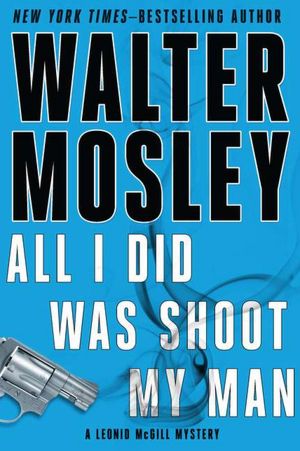 All I Did Was Shoot My Man by Walter Mosley
All I Did Was Shoot My Man by Walter MosleyToday is a national holiday. We pay respect to the memory of Martin Luther King, Jr., the American clergyman and Nobel Peace Prize winner who advocated nonviolent civil disobedience in the Civil Rights Movement. Dr. King was assassinated on April 4, 1968. I wish he were alive today to see Barack Obama sworn in for his second term as United States President.
 |
| Walter Mosley photo by David Burnett |
 The childhood of book narrator Leonid Trotter McGill was disrupted when his anarchist father abandoned his New York City family to fight in a South American revolution. LT's mother died of a broken heart. His brother Nikita took to crime and is now in prison for robbery. LT, an ex-boxer, was once an expert in altering evidence to contaminate a criminal investigation. He planted evidence, changed phone records or forged documents to direct suspicion to an innocent party. Sometimes the people LT framed went to prison, but most often he created enough doubt for the district attorney to drop the case. He is now trying to give up his bent life and is working as a private investigator for his own agency. He has valuable resources in both criminal circles and law enforcement. Before last year, he even had his own Javert in the form of Carson Kitteridge, a cop whose mission was to bring LT, suspected of "everything from contract murder to armed robbery, from kidnapping to white slavery," to justice. Kitteridge still has his eye on LT and gives him a hard time, but he and his colleagues have finally backed off.
The childhood of book narrator Leonid Trotter McGill was disrupted when his anarchist father abandoned his New York City family to fight in a South American revolution. LT's mother died of a broken heart. His brother Nikita took to crime and is now in prison for robbery. LT, an ex-boxer, was once an expert in altering evidence to contaminate a criminal investigation. He planted evidence, changed phone records or forged documents to direct suspicion to an innocent party. Sometimes the people LT framed went to prison, but most often he created enough doubt for the district attorney to drop the case. He is now trying to give up his bent life and is working as a private investigator for his own agency. He has valuable resources in both criminal circles and law enforcement. Before last year, he even had his own Javert in the form of Carson Kitteridge, a cop whose mission was to bring LT, suspected of "everything from contract murder to armed robbery, from kidnapping to white slavery," to justice. Kitteridge still has his eye on LT and gives him a hard time, but he and his colleagues have finally backed off.When All I Did Was Shoot My Man begins, LT is trying to help Zella Grisham, freshly released from prison. One day, Zella had gone home sick from work to find her boyfriend Harry Tangelo in bed with her best friend, Minnie Lesser. Zella grabbed a gun and shot Harry three times. Harry survived and the court would probably have been lenient had someone not called the police to suggest they check Zella's journal in her padlocked storage unit. In the unit was evidence linking her to the $58 million robbery of Wall Street's Rutgers Assurance Corporation. Zella insisted she knew nothing about the robbery. LT knows she's innocent because he'd been hired to plant the evidence. LT felt bad framing the pregnant Zella, so he subtly altered the false evidence. Eight years later, LT got a windfall from a grateful client and called attorney Breland Lewis to suggest the planted evidence be reexamined. As a result, Zella left prison.
Zella's freedom rekindles the robbery investigation by the police and Rutgers Assurance. LT becomes involved when Zella asks him to find the baby she gave up for adoption and to track down Harry so she can apologize. Although LT doesn't know who masterminded the robbery, he and his own family are threatened when people peripherally connected to the crime begin dying.
Mosley is a fine writer and storyteller who uses the backdrop of crime to examine his fully-realized characters. LT is compassionate and capable of self-scrutiny. His struggles with his temper and the past, and his attempts to do the right thing by others, are woven into his investigation. Even before this new danger, his family was unraveling. His wife has tried time and again to find another man so she can leave him. Currently, she drinks herself into a stupor. His oldest son, gentle Dimitri, has moved out to live with the dangerous Tatyana Baranovich. Daughter Shelly is dating a much older man. LT has talked his hip youngest son, Twill, into joining his detective agency, and sets him to work on an investigation involving a rich man's son who has fallen in with bad companions. A lover who left LT wants to return, and there's a chance his father didn't die in that South American revolution after all. There are many balls for LT to juggle in All I Did Was Shoot My Man.
On the day that we remember Martin Luther King, Jr., I wish we could say racism was a thing of the past. Unfortunately, we can't but I like what LT says about it:
I'm a twenty-first-century New Yorker and therefore have little time to contemplate race. It's not that racism doesn't exist. Lots of people in New York, and elsewhere, hate because of color and gender, religion and national origin. It's just that I rarely worry about those things because there's a real world underneath all that nonsense; a world that demands my attention almost every moment of every day.
Racism is a luxury in a world where resources are scarce, where economic competition is an armed sport, in a world where even the atmosphere is plotting against you. In an arena like that racism is more a halftime entertainment, a favorite sitcom when the day is done.This book, with its complex story line and memorable characters, is a very satisfying read.





No comments:
Post a Comment